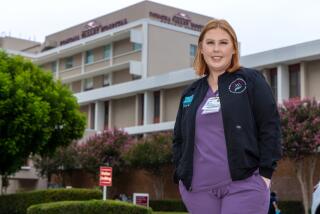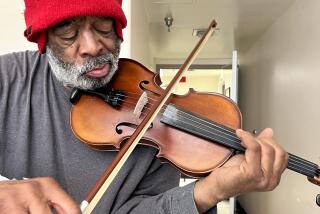The ‘problem with nurses’ is a problem with healthcare
- Share via
The Times’ June 12 expose about the California Board of Registered Nursing oversimplifies the issue. The so-called problem with nurses is really just another aspect of the shortcomings in the overall healthcare system.
I have been a nurse for more than 30 years. Although I don’t work in clinical settings now, I’m in them regularly -- at nursing homes, rehabilitation centers and acute-care hospitals. I am not excusing the horrible mistakes made by nurses who gave multiple doses of the same medications or did not properly inform physicians of the medications they were providing, per the physicians’ orders. There are standards of practice for dealing with the administration of medications, which all nurses and physicians should follow to the letter. But the problem is far more complex.
First, the Board of Registered Nursing had staffing problems. Until last week, three of its nine positions were vacant (the governor filled two of those vacancies). In addition, prior to last week, three of the board’s members were not practicing nurses. I am glad to see that since The Times published its story on July 12, Gov. Arnold Schwarzenegger has appointed to the board nurses from several fields. I hope the new board members are able to make definitive changes in a short amount of time.
The second issue is substance abuse, a problem that afflicts healthcare professionals at a higher rate than the general population. This does not excuse the Board of Registered Nursing for not expediting the reviews of the accused nurses, but the board’s program to divert nurses with substance-abuse problems into treatment and monitor their progress isn’t properly funded or administered. It’s worth noting that many of these problems start with drugs prescribed by physicians.
Third, there is a nursing shortage. On average, nurses are paid about one-third as much as physicians. Mind you, nurses are paid well compared to teachers, another predominantly female profession. And people are often not moved to go into nursing unless they are altruistically inclined. But the problem is exacerbated by the dwindling supply of training programs for nurses (several major schools of nursing have closed over the last few decades) and a lack of will in high schools to educate students about nursing and other vocational and professional choices. I believe this is changing, but spots for students in associate-degree nursing programs and bachelor’s degree programs are very few.
And finally, there’s the issue of nurse-to-patient ratios. In 1999, then-Gov. Gray Davis signed a bill into law that increased the number of nurses in California by 80,000. However, nurses are being burdened with patients that require more intensive care. Typical emergency room patients are sicker today than they were 20 years ago -- that’s a byproduct of our poor healthcare system. People are not treated or counseled adequately by their physicians regarding their problems, and there is little follow-up education. Once upon a time, when actual registered nurses worked in physicians’ offices, the nurse would be the educator. Now physicians see too many people during their day and education is not their priority.
As I said before, the problem is not just a “problem with nurses.” It’s a problem with healthcare.
Barbara Greenfield is president and clinical director of South Pasadena-based BG Nurse Consultants.
More to Read
A cure for the common opinion
Get thought-provoking perspectives with our weekly newsletter.
You may occasionally receive promotional content from the Los Angeles Times.










